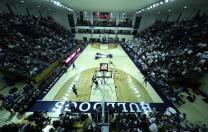The original decision to create post-season basketball tournaments in the Ivy League was hard fought, and decades in the making. The first documented clamorings date to at least 1995, when a news report discussed interest in the possibility from Yale’s players and coaches. Fran Dunphy, who won 10 Ivy titles as Penn’s coach before becoming Temple’s coach in 2006, says he supported the idea because “the greater good would be served.” Most league basketball players and coaches concurred. Harvard women’s coach Kathy Delaney-Smith says that the women’s coaches—who held nine tournaments in the 1970s and 1980s—wanted the tournaments as well.
Some of the league’s ADs, however, were unconvinced. Penn’s Steve Bilsky argued for sending the regular season champion—more likely to be a stronger, tested team—to the NCAAs. “That actually gave us some pause,” says Tom Beckett, Yale’s former AD. “…Are 14 exams the best measure of the best team, or is it who is playing the best at this time of year?” Former Ivy League executive director Jeff Orleans says that consensus on the format and financing would have been a challenge, and that the league’s university presidents likely would have rejected the idea as “a symbol of the excess of athletics that they were trying to avoid.”
But the obstacles gradually dissipated. For one thing, the league grew deeper. From 1959 to 2007, Penn and Princeton won 50 conference championships (including shared regular-season titles); tournaments amplified the risk of sending a weaker team to the NCAAs. In the early 2000s, the landscape shifted. In 2002, Yale won a share of the title, the first time a school other than Penn or Princeton had broken through in 24 years. In 2008, Cornell won the first of three straight titles, culminating in a NCAA Sweet 16 run in 2010. Meanwhile, Stemberg coach Tommy Amaker remade the Harvard program, which shared the title with Princeton in 2011 and won it outright in 2012. That spring, the men’s coaches submitted a proposal for a four-team tournament.
The ADs voted against it but agreed to meet with the men’s and women’s coaches that October, the first time all 24 of them had sat down together on the issue. Dartmouth AD Harry Sheehy recalls seeing a “groundswell among the coaches.” The answer was still no, but in 2014, after several of the opposing ADs retired, a working group came together to revisit the idea. The electric atmosphere at a 2015 Harvard-Yale playoff at the Palestra (Harvard won with a last-second shot) provided another shove, and finally a proposal for the tournaments was passed along to the presidents. They supported it.
“I think part of the willingness,” Orleans says now, was that the universities had had time to establish and evaulate the Academic Index, a system governing student-athlete admissions. They felt confident that the universities’ academic priorities would be maintained. At the same time, most Division I athletic programs were becoming increasingly super-heated and financially driven—allowing Ivy universities to maintain a distinction between their approach to sports and that of the rest of their division, despite agreeing to tournaments. “Conservatism is a relative thing,” Orleans says.
In April 2016, the Ivy League announced a pair of tournaments, featuring the top four men’s and women’s teams.








